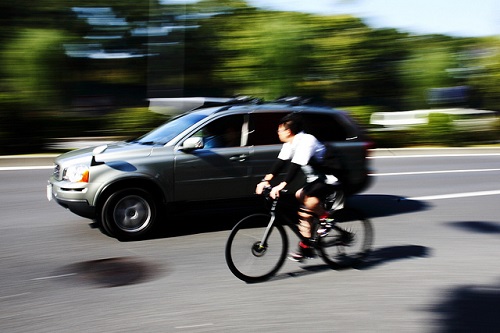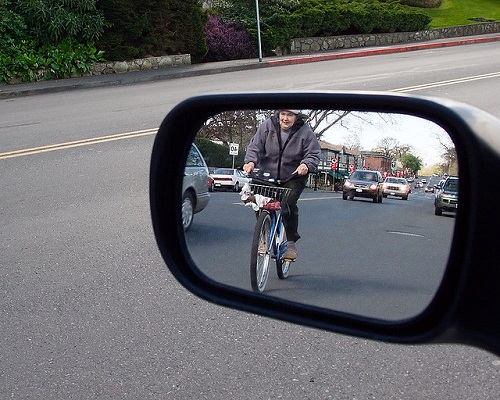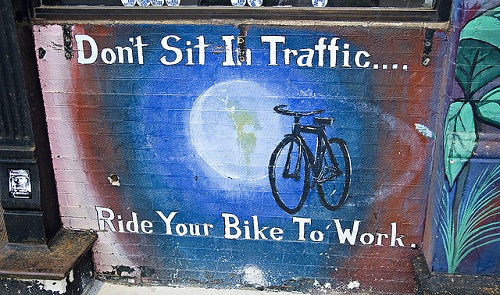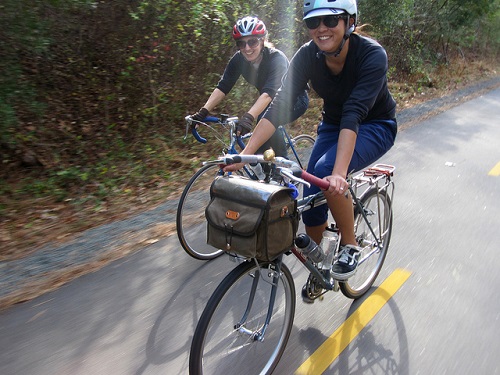Years ago I was driving up to a stop sign and getting ready to make a right turn. I looked to my left, didn’t see any cars, and started to go when my wife yelled, “Watch out!” I hit the brakes and a young man on a bicycle rolled by in front of me. I did not see him. Well, to be more precise, I did not look for him. There is a difference. I made a mental note of that close call thinking it would help me remember to look for bikes in the future. I was wrong. That note quickly fell off my mental corkboard. But these days I remember all the time. Why? Because I bike commute.

Bike commuting has made me a better driver. Riding in traffic on a bike makes me more vulnerable, and as a result of that, I am more vigilant and observant. As a cyclist I don’t expect to be seen by drivers, so I’m always in a defensive mode. I’m ready to take evasive action when an oncoming car turns left across my path or when a car to my right turns onto the roadway in front of me. I have avoided many close calls over the years simply because I was paying attention. By the way, not looking for bicycles is not a behavior unique to vehicle drivers. I’ve had two close calls with other cyclists because they were looking for cars and not bikes. These experiences have made me more aware of bike and pedestrian traffic while I’m behind the wheel of a car.

Bike commuting has also helped me slow down as a driver. My commute to work is about 10 miles. In the old days, I was always on a point system when I was driving. If I was in the faster moving lane and getting ahead of other cars, I was up in points. If I was stuck behind a bus while cars passed by on my left, my points went down. Going 10-15 over the speed limit was not unusual. Besides, everybody else was doing it, which makes it even easier to rationalize. Over and over I joined the race to the next red light. If someone darted ahead and then squeezed into the gap in front of me, I was down a point.
That used to bug me, but not anymore. I’ve long since discarded that irrational score keeping system. It really did nothing more than stress me out and unnecessarily so. I look back with incredulity and wonder why I put myself through all that. I was thinking in a counter-productive manner. It was all about comparing myself to everyone else. I was ignoring my own wellbeing.

Bike commuting has taught me to slow down and relax when I drive. On the rare occasions when I drive to work, I stick pretty close to the speed limit. I don’t mind other drivers passing me because their progress is completely unrelated to my progress. I’ve learned that any time I save by keeping score is meaningless. If I arrived at a parking spot a minute later than I used to, I would still get to my desk on time. So now I avoid the self-induced stress. I let people out when they’re trying to exit with their drive-through coffee in hand. I don’t concern myself with my progress compared to everyone else. I don’t ascribe intent to every swerve, honk, or loud acceleration. I don’t take it personally when another driver is inconsiderate.
I see bikes and pedestrians while I’m driving, and I give them plenty of room. I don’t mind the time I spend behind a cyclist waiting for a space that will allow me to safely pass them by. I look for cyclists, and I appreciate it when they follow the rules of the road. They’re more predictable. I’m extremely cautious around those who ride unsafely – as long as I can see them.

There’s a question in the bike commuting world that cyclists use to contrast their commuting to the majority who drive to work. “When do you hear someone say they had a fun drive to work?” In my experience it’s a valid point. Even in my more relaxed mode, driving is not fun, but it’s a lot less aggravating than it used to be. Yet it doesn’t come close to the enjoyment I get from riding. Nor does it result in such a positive state of mind. //













